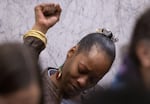UPDATE (Feb. 21, 5:04 p.m. PT) – After a four-week-long trial and a day and a half of deliberation, a jury in Portland has found Jeremy Christian guilty of all counts, including two counts of first-degree murder and a count of first-degree attempted murder.
The jury deliberated for 12 hours over three days.
On May 26, 2017, Christian stabbed and killed two men and injured a third on a Portland MAX light rail train.
Family members of victims in the courtroom audibly gasped when the verdict was read. Christian did not seem to react to the verdict announcement at all.

Victims and victims' family members react to verdicts of guilty on all twelve counts at the Jeremy Christian trial, Feb. 21, 2020.
Beth Nakamura / The Oregonian/OregonLive/Pool
Witnesses during the trial testified that before the stabbings, Christian directed a hate filled, racist rant at two black teen girls, one of whom was wearing a hijab.
Christian was found guilty of two counts of intimidation in relation to the two girls.
“He told us to die and that we don’t deserve to be here and that we should just go back to where we came from,” Destinee Mangum testified. She said he was focused on her and her friend, Walia Mohamed, at the time of his rant.
Neither of the girls was in the courtroom Friday, but Mangum’s mother, Dyjuana Hudson, was present. Hudson said the girls have been through a lot.
“It’s been a long, emotional ride,” Hudson told media after the verdict announcement. “It’s been very hard for them, and I’m just glad to see that I can go home and tell them that it’s OK now.”
On that day in 2017, when passengers intervened and tried to get Christian off the train, he stabbed them.
“Originally, I thought he punched me,” Micah Fletcher testified during the trial. “I realized there was blood on my fingers and thought, ‘that’s odd.’ Then I realized there was blood on my shirt, a lot of it. Then I realized it was coming from my neck.”
Ricky Best, 53, and Taliesin Namkai-Meche, 23, both died from several stab wounds Christian delivered in a matter of seconds.
Prosecutors also charged Christian with an assault from the day before, when they say he went on a similar racist rant and assaulted Demetria Hester, who is also black.
Christian was found guilty of the assault against Hester. He was also found guilty of intimidation charges related to his altercation with her.

Demetria Hester reacts to verdicts of guilty on all twelve counts at the Jeremy Christian trial, Feb. 21, 2020.
Beth Nakamura / The Oregonian/OregonLive/Pool
After Hester's assault, a passenger aboard public transit videotaped Christian ranting about his desire to stab people, which jurors saw during the trial.
Hester spoke to members of the media outside of the courtroom after the verdict was announced.
“It let people like Jeremy Joseph Christian know that you’re not going to get away with it, that we do have people that care about all of us because Black lives do matter,” She said.
She said she thinks Oregon needs to address white supremacy in the state.
The killings garnered national attention in part because they occurred as hate crimes were on the rise and the nation was becoming more aware of emboldened white supremacists.
Multnomah County prosecutors Don Rees and Jeff Howes argued that Christian had intent behind his actions on the train May 26.
“In that 11 seconds, [the] defendant has inflicted 11 stab wounds on three grown men,” Howes said. “It’s indisputable that the defendant did these things that were alleged.”
Through witness testimony, prosecutors also attempted to show Christian’s ties to white supremacist ideologies.

Jeremy Christian enters the courtroom to hear the verdict in his murder trial Feb. 21, 2020. The jury found Christian guilty on all 12 charges he faced.
Beth Nakamura / The Oregonian/OregonLive/Pool
Christian’s public defense attorneys, Greg Scholl and Dean Smith, didn’t dispute the killings and instead focused their case on why Christian attacked that day.
“We’re not basically disputing the most basic timeline or videos that were taken,” Smith said. “The evidence that you’re going to have, again, is evidence we both see, have looked at and come up with different interpretations.”
Christian’s attorneys argued the case wasn’t murder, but instead that he was acting in self-defense on the train and that he felt threatened by multiple people confronting him.
“Three against one?” Smith posed to jurors during his opening statement. “When you are defending yourself against three attackers, you cannot successfully defend yourself with hands and feet alone.”
They also said Christian had cognitive issues that made it hard for him to know what was happening.
One psychologist diagnosed Christian with executive function dysfunction, noting his ability to make decisions and assess his surroundings was “not where we expect it to be.”
Psychologist Dr. Timothy Derning also diagnosed Christian as being on the autism spectrum. After hours of testimony and cross examination, Rees asked Derning about Christian’s past racist remarks and violence.
“Have you heard of the duck test?” Rees asked.
“No, I haven’t,” Derning replied.
“If it looks like a duck, swims like a duck and quacks like a duck, it probably is a duck,” Rees said.
“I have heard of that,” Derning responded.
“So, it’s possible, isn’t it, that Jeremy Christian is actually exactly what he looks like?” Rees asked.

Victims and victims' family members react to verdicts of guilty on all twelve counts at the Jeremy Christian trial, Feb. 21, 2020.
Beth Nakamura / The Oregonian/OregonLive/Pool
Throughout parts of the trial, victims and their families sat in the courtroom, often through emotional testimony.
Beatrix Therese Van Olphen told jurors she was on the phone with her nephew, Namkai-Meche, just before he was killed.
“Please don’t get involved, it could be dangerous,” she recalled telling him. “Maybe you can film it or videotape it with your phone and send it to police.”
Namkai-Meche said he loved her and would call her back. But he never did.
The jurors are slated to return for a “sentence enhancement hearing” Tuesday afternoon, during which they’ll be able to weigh in on sentencing. Christian will be sentenced at a later time.
He could face a prison sentence of life without the possibility of parole.